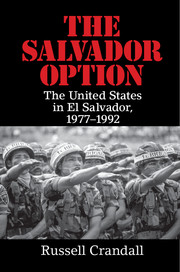Book contents
49 - Concluding Thoughts
from PART FIVE - POSTWAR
Published online by Cambridge University Press: 05 June 2016
Summary
We learned a lot in El Salvador. All of us got a baptism by fire in the early 1980s.
– Unidentified American diplomatAmericans like their wars quick, dirty, and violent.
– John Waghelstein, U.S. Army ColonelAs we conclude our story of a searing episode of Cold War–era U.S. foreign policy in America's geopolitical backyard, it is worth considering the relevance today of the Salvador Option that was a remarkable case of nation-building by proxy before nation-building became the overriding aim in two protracted American wars – Iraq and Afghanistan. It could well be that the Salvador Option's significance will loom larger in the years ahead, simply because the United States endured long, unsatisfying wars in Iraq and Afghanistan. Americans thus may be less likely to support major, boots-on-the-ground commitments, even as their nation continues to face threats from unstable societies. So figuring out the truth of this seemingly paradigmatic case of the light footprint approach is all the more important.
This study leads us to a set of essential related questions from the reality of the Salvador Option, questions that can be applied to other complicated counterinsurgency and nation-building situations. For starters, how does a powerful country balance out the broad geostrategic imperatives with the often shorter-term suffering caused by the policies being implemented? An effective answer requires an accurate sense of the means behind those policies and what they led to – something that is extraordinarily difficult to find in murky conflicts like El Salvador's civil war. The declassification of tens of thousands of pages of documents and the enviable advantage of hindsight has allowed us to consider the Salvador Option with a perspective and depth unavailable to those trying to make sense of this wrenching episode as it was unfolding.
U.S. foreign policy is, of course, not solely what is uttered publicly or described in newspaper accounts – and this was true in El Salvador; it also included the day-in-day-out churn of diplomatic cables, senior level officials’ talking points for meetings with Salvadoran counterparts, and other documents and conversations that were private in that period.
- Type
- Chapter
- Information
- The Salvador OptionThe United States in El Salvador, 1977–1992, pp. 496 - 506Publisher: Cambridge University PressPrint publication year: 2016



